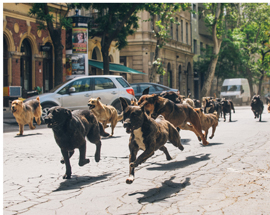ATOMIC DOG
 Thursday, April 9, 2015 at 11:41AM
Thursday, April 9, 2015 at 11:41AM
WHITE GOD - Kornél Mundruczó
White God has almost no thematic content. It doesn’t need any. It’s a spectacle: A hypnotic, suspenseful, surprisingly moving riot of human-on-dog, human-on-human and dog-on-human cruelty; unfocused social protest; and disruptive, assured cinema revolving around one – no, two – charismatic canines – Hagen, played by Hagen and his brother. Director Kornél Mundruczó presents his text with such technical and emotional bravado, you think there must be some subtext in there someplace. In this, White God resembles Daisies or other Czech revolutionary films of 60 years ago: things you’ve never seen before + directorial brio, but to what end? What end – beyond the welcome lessons that 1) We should be nicer to doggies, 2) There’s more to any doggie than meets the eye, 3) Mutts are superior to pure-breeds, and 4) Doggies possess more soul, poetry and, indeed, humanity, than most people.
Even showcasing things you’ve never seen before, White God revels in dog-movie tropes. There’s the sensitive young girl who alone values the doggie-protagonist at his true worth. There’s chase scenes featuring ineffective dogcatchers who symbolize the repressive power of the state. There’s a rageaholic, divorced dad who’s taught love by his daughter’s devotion to a doggie. There’s even a dog-hating orchestra conductor with silvery, orchestra-conductor hair who emotes with his nostrils. And there’s a brand-new trope: doggies as the visual locus of ambitious European art-movies. Godard’s Goodbye to Language introduced this trope with its many minutes spent following an adorable mutt. As ever, other filmmakers pick up what Godard puts down, and in this case, that’s doggies. One baffling trope is the title. Is it homage to Samuel Fuller’s unwatchable anti-racism parable, White Dog? Or does it reference Jack London’s immortal White Fang, another tale of a worthy beast turned bestial by human cruelty?
White God is about something. It’s just never clear what. If Mundruczó offers specific commentary, it remains opaque. Lowlife citizens make contemptuous references to ‘mutts’ and ‘mixed breeds’: is that an indictment of Hungary’s descent into fascism and anti-Semitism? The delicate ‘tween protagonist labors in an orchestra; does that mean only classical culture can redeem Hungary’s youth? These possibly thematic moments, presented with unrelenting intensity, play like signposts to a deeper meaning. They turn out to be background – the context through which Hagen lives his doggie life, with all its doggie terrors, joys, abandonment, violence and redemption. Every moment seems momentous and laden; the story stays compelling. The viewer’s mistake might be thinking any moment carries any greater weight than another. Weightiness proves to be the biggest tool in Mundruczó kit, that’s all. He’s certainly in command of his material. He elicits rich, nuanced, weighty performances from everyone. Hagen and his brother demonstrates a broader emotional range than most of their human co-stars. The humans under- or overplay depending on whether they’re downtrodden or villainous. The drama stays sufficiently gripping, most of the time, anyway, to render the lack of aboutness unimportant.
White God proves to be a Bizarro Ol’ Yeller. And Ol’ Yeller remains the most heartbreaking movie ever made. If you’re an adult and have not seen it, stay away. You will never recover. Ol’ Yeller was crude and made cheaply. White God is knowing and polished. Though, as in Ol’ Yeller, the human-on-dog cruelty proves almost impossible to watch. Hagen the doggie possesses more moral agency than anyone except his beloved owner, as did Ol’ Yeller. Humans get put down for the common good, as was poor Ol’ Yeller. When Ol’ Yeller turned violent toward people, he had rabies and was out of his little doggie mind. When Hagen takes his vengeance, White God presents his actions as a perfectly rational response to provocation.
The doggie performances are astonishing. The extended scenes of 250 doggies acting in concert are pure pleasure. The director wisely cuts away from showing humans beating doggies. He tries gamely to show a vicious dogfight in gory detail. Anyone who ever owned a doggie will see these are two doggies wrestling playfully with mean-doggie sounds added later. Moments like this – such as when Hagen’s brother appears in close-up and is so clearly not Hagen – lessen the film’s considerable hold. As with the lack of aboutness, it’s hard to say why the story stays so involving, but it never lags.
In the end, White God is about the joy of watching doggies. Want to see 250 joyous doggies splash at top speed through a 50-yard puddle? Want to see them race in a malevolent block-long pack through deserted, moonlit Hungarian backstreets? Want to see the lead doggie turn into a white whale and kick major Hungarian Ahab ass? Of course you do, and why not? Hagen’s revenge provides plenty of catharsis, and not just for Hagen.
The finale, with its homage to trumpet solos and quasi-religious overtones – man prostrates himself before dog – makes absolutely no sense, but hits with the power of an ancient fable. The final shot of all those poised doggies waiting for….something, evokes Kubrick and The Birds in ways that bypass rationality altogether. This is the source of White God’s power. Mundruczó connects with the archetypal and profound in the animal nature of humans and and the human aspects of dogs. And that has nothing whatever to do with meaning.
Photo courtesy of Magnolia Pictures
 Daisies,
Daisies,  Godard,
Godard,  Samuel Fuller
Samuel Fuller 
